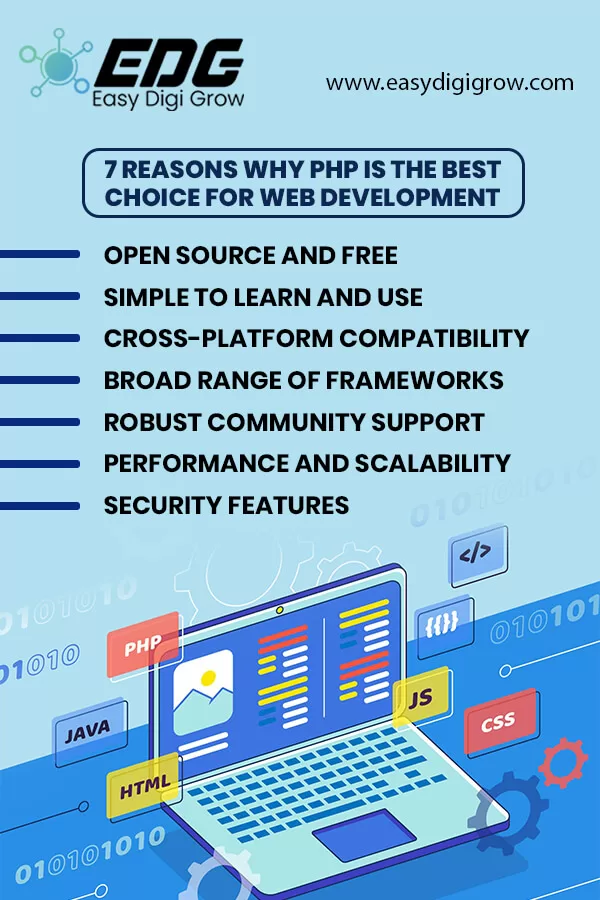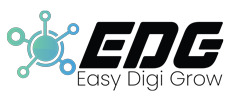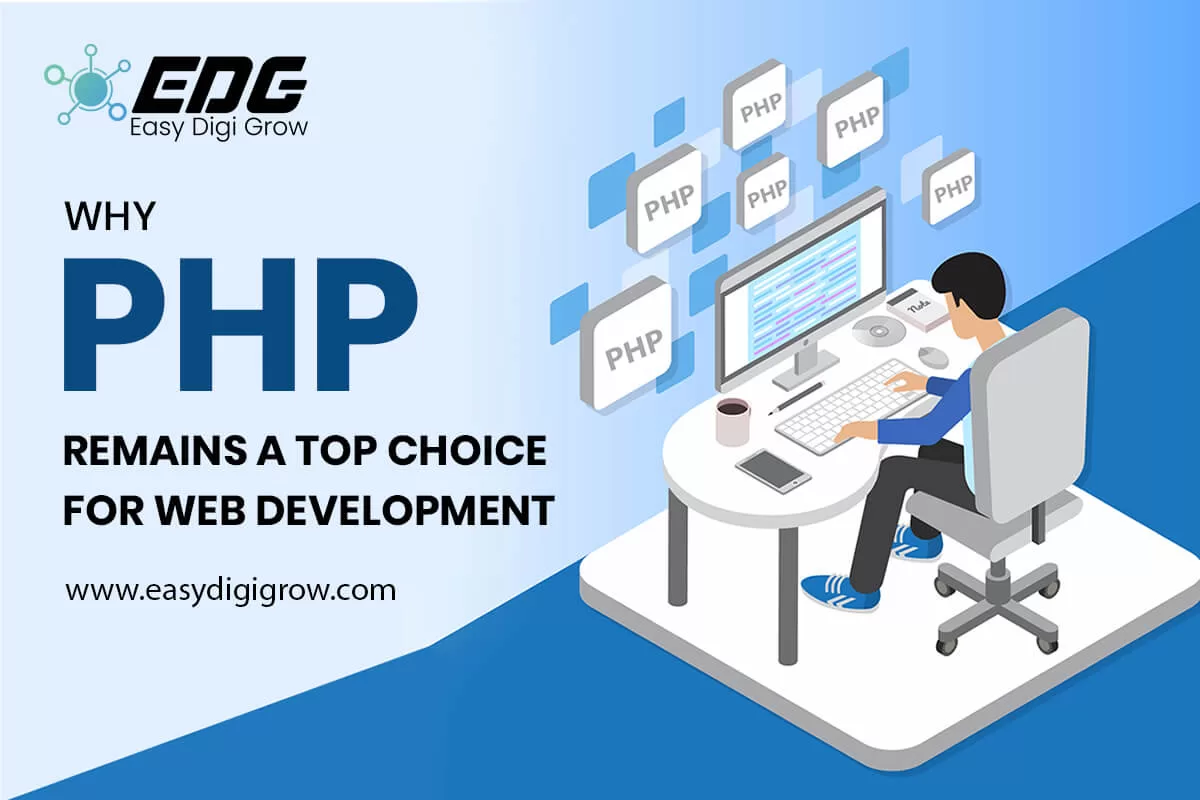Web development is important for developing a strong online presence for businesses and individuals. Choosing the correct programming language and development tool might be difficult because there are so many options available. However, PHP (Hypertext Preprocessor) has been a popular choice for web programming for more than two decades. In these years, PHP proved itself to be flexible, inexpensive, and handy software, which is most appreciated by developers and businesses all over the world.
In this blog, we will discuss why PHP is still a reliable choice for developing dynamic websites and applications and why it has become so very popular among web developers.
Introduction to PHP
PHP stands for Hypertext Preprocessor. It is renowned as an open-source and server-side scripting language designed primarily for web development. Rasmus Lerdorf developed it in 1994, and since it has become one of the most popular programming languages for dynamic website and application development. PHP’s ability to be embedded directly into HTML is one of its best features. This makes it easy for developers to add functionality to websites. PHP is often used to make websites that are engaging and easy for people to use.
Why PHP is Popular for Web Development
PHP is still a popular tool for web development, and there are numerous reasons for this. It is popular among developers because it is simple to use, supports a wide range of frameworks, and can handle difficult tasks efficiently. Whether you want to start a small blog or a large eCommerce platform, PHP is the tool you need to make your ideas a reality.
Developers appreciate PHP allows fast and efficient development of high-performance websites. Additionally, higher-end PHP frameworks like Laravel, Symfony, and CodeIgniter provide the ability to build highly secure apps that are also scalable and feature-rich and satisfy the expectations of modern app development.
Reasons Why PHP is the Top Choice for Web Development
While there are many programming languages and frameworks on the market. For now, PHP remains one of the highly popular programming languages in building websites for several reasons. Let’s look at these reasons in depth:
- Open Source and Free
One of the primary benefits of PHP is that it is open-source and free to use. Developers do not have to pay for licenses or subscriptions, which drastically reduces the cost of web development. Furthermore, because PHP is open-source, it has a large developer community that contributes to its continuous advancement, resulting in a constantly changing language.
- Simple to Learn and Use.
PHP syntax is simple and easy to understand, even for people who are new to web programming. Developers can begin coding dynamic websites without prior programming skills. PHP’s ease of learning makes it a popular choice for developers looking to get their projects up and running quickly. Furthermore, it may be integrated directly into HTML, enabling seamless connection with front-end development.
- Cross-platform compatibility.
PHP is highly adaptable and works with many operating systems, including Windows, Linux, and macOS. Its cross-platform nature ensures that PHP software can work smoothly on different servers and platforms, making it simple to deploy websites across multiple hosting environments.
- Broad Range of Frameworks
PHP has various frameworks that help simplify web development, including Laravel, Symfony, CodeIgniter, and CakePHP. These frameworks offer a systematic method for creating scalable and secure online applications. This not only shortens development time but also enhances product quality.
- Robust Community Support.
PHP has one of the largest and most active developer communities globally. This community provides extensive documentation, tutorials, and forums where developers can find solutions to common problems. The availability of such vast resources guarantees that PHP developers have continual access to aid and support, making the language more reliable.
- Performance and Scalability.
PHP is well-known for its strong performance, particularly when combined with various caching strategies that increase website speed. It can efficiently handle large-scale web applications, ensuring scalability as a business grows. Websites built with PHP can handle massive traffic without sacrificing performance or user experience.
- Security features.
Security is a top requirement for any web application, and PHP addresses it through a variety of built-in security measures. PHP frameworks include built-in modules for authentication, input validation, and encryption, making it simple to develop secure websites that protect user data.
Importance of PHP in Web Development
PHP (Hypertext Preprocessor) is a popular and dependable programming language for web development nowadays. It has existed since 1994 and is constantly expanding to meet the changing demands of online technologies. PHP is vital for online development, powering over 75% of server-side programming websites, including well-known platforms like WordPress, Facebook, and Wikipedia.
One of the core reasons why PHP is useful for building websites is that it is easy to use. It makes it easy for developers to give some dynamic features to HTML, bringing more interactivity and user-friendliness into the web pages. PHP is an open-source language, free to use, thereby making it attractive for startups, small businesses, or developers with a low budget. This server is suitable for most businesses, including eCommerce and education, because it can support both small-scale and large-scale web applications.
PHP and Content Management Systems (CMS)
PHP plays a pivotal role in powering some of the world’s most popular Content Management Systems (CMS), such as WordPress, Joomla, and Drupal. These CMS platforms are widely used by businesses, bloggers, and developers to create and manage content-rich websites. WordPress, for example, is based on PHP and powers over 40% of the internet’s websites.
For developers working with these CMS platforms, proficiency in PHP is essential. It enables developers to create custom plugins and themes in addition to the extension of CMS capabilities to meet the requirements of a specific project. This compatibility with CMS platforms is one of the reasons PHP remains dominant in the web development environment.
Performance and Scalability with PHP
When it comes to performance, PHP is excellent at developing quick and responsive websites. PHP scripts are executed on the server to ensure that websites load quickly and provide a good user experience. For businesses, this is essential because poor website performance can result in increased bounce rates and lower customer satisfaction.
PHP is also incredibly scalable, making it an excellent choice for firms that need to grow their online presence with time. So, for all the low traffic or millions of visitors, PHP can scale up to your needs with the preservation of performance. PHP’s scalability makes it a good choice for developing eCommerce websites, enterprise apps, and other large-scale web projects.
Security Features in PHP
Security is the first consideration in web application development. PHP offers several inherent security features that shield websites and apps from common threats such as SQL injections, XSS, and data breaches. Developers of PHP can also leverage third-party tools and frameworks to improve the security of PHP applications.
In addition, PHP frameworks such as Laravel and Symfony come with pre-built security features, making it easier for developers to create secure applications. These frameworks include capabilities for handling authentication, data encryption, and input validation, all of which contribute to the protection of websites against potential vulnerabilities. PHP, with the proper security procedures, may be utilized to create secure and trustworthy web applications.
PHP’s Large Community Support
There’s an enormous, active community attached to PHP. PHP has been in existence for more than two decades, so there are plenty of documents, tutorials, and other resources available for developers at all levels. Whether you’re a newbie learning the fundamentals or an experienced developer seeking advanced solutions, the PHP community has you covered.
PHP web development is community-driven, ensuring that it continues to evolve. This language is constantly developed and updated to ensure that it remains as current as well as effective as possible for new web development. Developers can easily get immediate help with forums, discussion boards, and social media groups so it is one of the reliable choices which have worked for their apps.
Why PHP is Cost-Effective for Businesses
If a business wants to make a website or web app without spending a lot of money, PHP is a great choice. PHP is an open-source language, which eliminates the need for expensive licenses or subscriptions, lowering overall development expenses. Furthermore, because PHP is so extensively used, there is an enormous number of experienced engineers available, making recruiting talent less expensive than with less popular programming languages.
The cost-effectiveness of PHP doesn’t stop at development. Hosting providers often offer affordable options for PHP-based websites, which further reduces the costs for businesses. Whether you’re running a small eCommerce business or a huge corporate website, PHP can help you meet your objectives without breaking the bank.

Conclusion
Finally, PHP is the most used web development tool because it is easy to use, affordable, and versatile. Because it is available for free, developers can reach a great number of operating systems and collaborate easily, which helps in the support of high cross-platform compatibility for this programming language. PHP due to its powerful security features, not only makes websites dynamic but also secure and scalable.
Whether you’re a business owner or a developer, including PHP in your next project will assist you in creating a high-quality, user-friendly website that satisfies your requirements quickly. PHP is still one of the reliable tools for 2024 and beyond supporting popular platforms to deliver good performance as well as security.
In today’s fast-paced web development landscape, PHP continues to shine because of its simplicity, adaptability, and strong community backing. Its low cost, cross-platform nature, and ability to handle projects of all sizes—from blogs to eCommerce sites—make it an excellent choice for building fast, secure, and user-friendly websites.
 seolounge
seolounge


